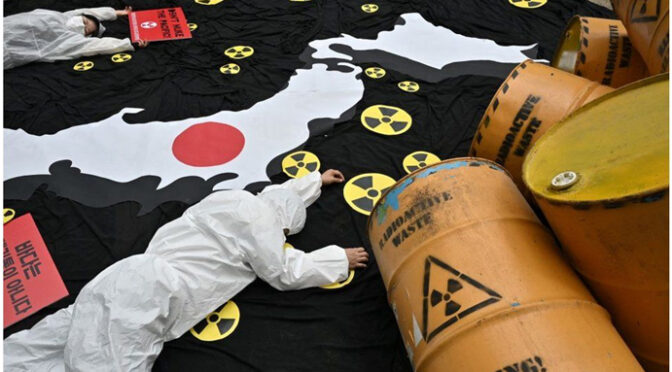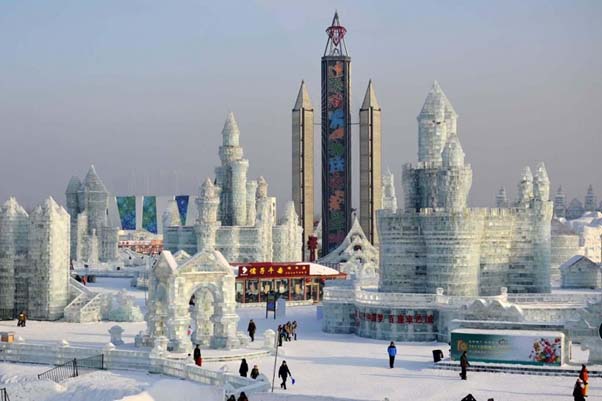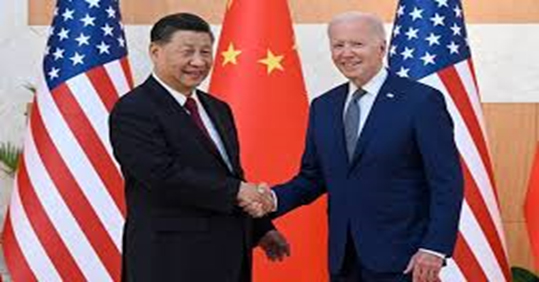WORLD AND LAND OF THE RISING SUN : JAPAN ON RELEASING FUKUSHIMA’S RADIOACTIVE WASTE
Posted on : August 1, 2023Author : Purnima Prasad

Japan will soon begin dumping radioactive water into the ocean after the United Nations Nuclear Regulatory Agency approved a controversial plan to go into effect 12 years after the Fukushima meltdown. Plans to release the treated wastewater have been in the works for years, and in 2019 the environment secretary said there was “no other choice” as space to contain pollutants was running out. The devastating earthquake and tsunami of 2011 damaged the power and cooling systems of the Fukushima nuclear power plant, overheated the reactor core, and contaminated the water inside the plant with highly radioactive materials. Since then, new water has been pumped in to cool the fuel residue in the reactor. At the same time, groundwater and rainwater percolate, creating even more radioactive wastewater, which must now be stored and treated. The state-owned Tokyo Electric Power Company (TEPCO) has built over 1,000 giant tanks, currently holding 1.32 million tons of wastewater. That’s enough to fill over 500 Olympic swimming pools. But the space runs out quickly. The company said building more tanks was not an option and that it needed to make room for the plant to be safely decommissioned. This process includes decontamination of the facility, demolition of the structure and complete decommissioning. Despite, this decision of Japan is met with heavy criticism from both outside and inside.
China is urging Japan to reach agreements with regional countries and international organizations before releasing water. The Chinese government also accused Tokyo of violating its “international moral and legal obligations” and warned that it “will have to face all the consequences” if it goes ahead with the plan. The two countries now have an awkward relationship, with tensions escalating due to Japan’s recent military buildup and China’s provocative moves around Taiwan. Japan consulted with neighbouring countries and invited a team of South Korean experts to visit the Fukushima nuclear power plant in May. But it is unclear to what extent it will get approval from neighbouring countries before proceeding. South Korea, which, unlike China, is interested in strengthening ties with Japan, pushed its concerns by saying it “respects” the IAEA’s findings. But the approach has angered South Koreans, with a recent poll showing 80% of the public worried about water release. “The government is implementing strict policies to avoid littering into the sea…But now the government has not said a word (to Japan) about sewage flowing into the sea,” said Park Hee-jun, a South Korean fisherman. said. BBC Korean. “Some officials are arguing that if they don’t want to confuse consumers further, they should be silent. I think that’s nonsense.” Thousands took part in protests in Seoul demanding government action as some shoppers stocked up on salt and other essentials out of fear of food supply disruptions.
In response, South Korea’s parliament last week passed a resolution opposing the water discharge plan, but it’s unclear how that will affect Japan’s decision. Authorities have also introduced “strict inspections” of seafood and maintain a ban on imports of Japanese seafood from the area around the Fukushima nuclear plant.
To ease public fears, Prime Minister Han Duk-soo said he intended to demonstrate that the water from Fukushima was safe to drink, but officials said last week that only a small portion of the runoff was in South Korean waters. Elsewhere in the region, several island states have also expressed concern, with the regional group Pacific Islands Forum calling the plan another “massive nuclear pollution disaster.”
Despite the enormous global scientific and political interest in the status of Fukushima treated water, local fishermen and Fukushima coastal communities, living in the shadow of the nuclear power plant and daily accept the effects of the release as they still face banof their products in other market and the release of radioactive water will only bring further financial burden. Despite the concerns of key stakeholders living on it, the rationale limited the visibility of the aftermath of the Fukushima accident in scientific-political discourse. Even if TEPCO and the government minimized the environmental impact through careful management of the process, some international experts believe that, Indirect socio-economic impacts of treated water discharge on fisher communities are likely to be felt. Year-round in the long run. Proposals from the community of researchers and institutions working on science-policy linkages on reclaimed water in Fukushima should be based on a deep understanding of the local community context and address the concerns of local stakeholders.
To ease up the chaos, the researchers and scientists have a positive stance in this situation-
Professor Robin Grimes, Professor of Energy Materials, Imperial College London, said that the concentration of the radionuclide tritium remaining in the wastewater is very low and well below the level of environmental concern. Tritium status is important. In this case the tritium is part of a water molecule (tritiated water) but not bound to a more complex compound. These low levels of tritium are greatly diluted by release, as there is no established mechanism for bioaccumulation of tritiated water. It would be interesting to see if there is a detectable increase in tritium within the discharge region compared to the natural tritium produced by the cosmic ray process. Admittedly, it is very difficult to compare the environmental impacts of different radionuclides, but concentrations of tritium would be much lower than levels of naturally occurring radionuclides.Smith points out that the release of tritiated water is part of normal nuclear power plant operation. He said 400 to 2,000 terabecquerels of tritium are released into the ocean each year from the Heysham nuclear power plant and the Sellafield nuclear fuel fabrication plant in the UK. It’s a very weak beta-emitter, so overall it’s not very radiotoxic.
Lastly, it is sure to say that despite all the arguments and counter-arguments,the geo-politics of the region depends and revolves heavily on the ecological causes and effect it will have in future forthis region, not just mere for the ‘Land of the Rising Sun’.
References
Expert reaction to IAEA safety review and report on Japan’s plans to release treated water into the sea. (2023, JULY 4, ). Retrieved from Science media centre: https://www.sciencemediacentre.org/expert-reaction-to-iaea-safety-review-and-report-on-japans-plans-to-release-treated-water-into-the-sea/
IAEA Releases First Report on Safety of Planned Water Discharge from Fukushima Daiichi Site. (2022, April 29). Retrieved from IAEA: https://www.iaea.org/newscenter/pressreleases/iaea-releases-first-report-on-safety-of-planned-water-discharge-from-fukushima-daiichi-site
Jessie Yeung, M. M. ( 2023, July wednesday 5). Japan will soon release Fukushima radioactive water into the ocean. How worried should we be? Retrieved from cnn: https://edition.cnn.com/2023/07/04/asia/japan-fukushima-wastewater-explainer-intl-hnk/index.html
Mabon, L. (2022, October 28). Bring voices from the coast into the Fukushima treated water debate. Retrieved from PNAS: https://www.pnas.org/doi/10.1073/pnas.2205431119
Wong, T. (2023, july Wednesday ,4). Fukushima: Anxiety and anger over Japan’s nuclear waste water plan. Retrieved from BBC News: https://www.bbc.com/news/world-asia-66106162
Purnima Prasad
Intern, Asia in Global Affairs
The originality of the content and the opinions expressed within the content are solely the author’s and do not reflect the opinions and beliefs of the website.




